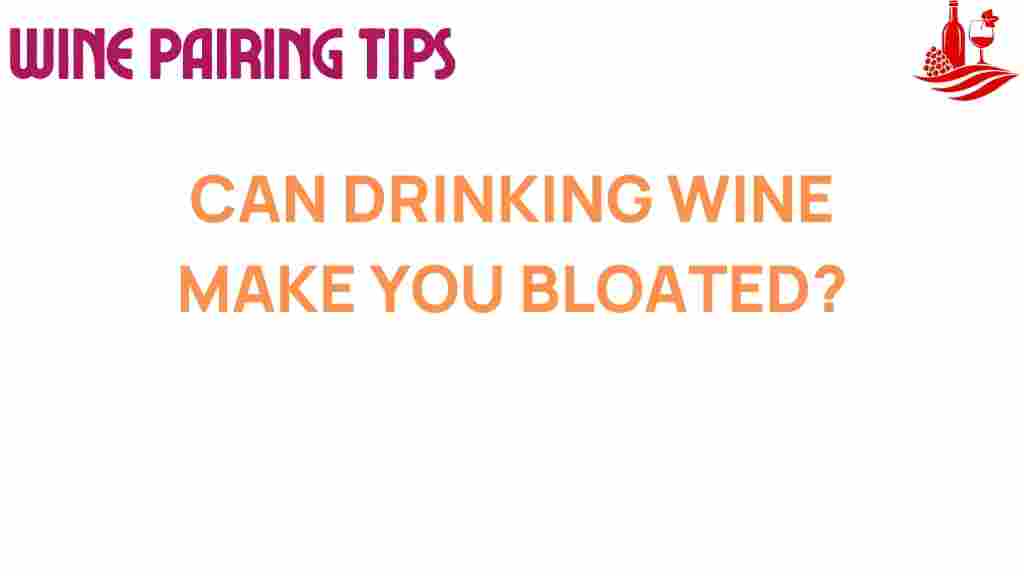Unraveling the Mystery: Can Drinking Wine Really Cause Bloating?
Wine is a popular beverage enjoyed by many around the world. It’s often associated with social gatherings, fine dining, and relaxation. However, for some individuals, drinking wine can lead to uncomfortable bloating. In this article, we will explore the relationship between wine and bloating, examining the underlying causes, the effects on digestion, and practical tips to mitigate this issue. Whether you are a casual wine drinker or a connoisseur, understanding how wine affects your gastrointestinal health is essential.
The Science Behind Bloating
Bloating is a common gastrointestinal complaint that can result from various factors, including diet, lifestyle, and individual health conditions. When we talk about bloating in relation to wine, it’s crucial to understand the process of digestion and how alcohol, particularly wine, interacts with our bodies.
When we consume wine, our body begins to digest it. The fermentation process involved in producing wine can introduce certain elements that might contribute to bloating. Here are some key points to consider:
- Fermentation: Wine is produced through the fermentation of grapes, which can lead to the creation of natural sugars and carbon dioxide. This carbon dioxide can accumulate in the digestive system, leading to a sensation of fullness and bloating.
- Alcohol and Digestion: Alcohol can slow down the digestive process. This may lead to gas buildup and bloating, particularly if consumed in large quantities.
- Histamines and Sulfites: Many wines contain histamines and sulfites, which can cause reactions in sensitive individuals, leading to gastrointestinal discomfort.
How Wine Affects Digestion
Understanding how wine affects digestion is crucial to grasp why it can cause bloating. Here are some factors to consider:
- Stomach Acid Production: Alcohol consumption can increase stomach acid production, which may irritate the stomach lining and lead to discomfort.
- Gut Flora: The type of wine consumed can affect the balance of gut bacteria. Some wines may promote a healthy gut flora, while others can disrupt it, leading to bloating.
- Food Pairings: Often, wine is consumed with food. Heavy or rich foods can exacerbate bloating when paired with wine, particularly if the food is high in fat or sugar.
Identifying the Culprits: What Types of Wine Cause Bloating?
Not all wines are created equal when it comes to their effects on digestion. Here are some types of wine that may be more likely to cause bloating:
- Sparkling Wines: The carbonation in sparkling wines can lead to an increased gas buildup in the stomach, contributing to bloating.
- Sweet Wines: Wines with high sugar content may ferment in the gut, leading to gas production and subsequent bloating.
- Red Wines: Some red wines contain higher levels of tannins and histamines, which can trigger digestive issues in sensitive individuals.
How Much Wine is Too Much?
Moderation is key when consuming wine. While some people may tolerate a glass or two without issues, others may find that even a small amount can lead to bloating. Here are some guidelines:
- Limit Intake: Aim for moderate consumption—generally one glass for women and two for men.
- Stay Hydrated: Drinking water alongside wine can help dilute its effects and promote better digestion.
- Choose Wisely: Opt for wines that are lower in sugar and avoid sparkling varieties if you are prone to bloating.
Troubleshooting Bloating After Drinking Wine
If you experience bloating after drinking wine, there are several steps you can take to alleviate discomfort:
Immediate Remedies
- Walk It Off: A gentle walk can help stimulate digestion and relieve bloating.
- Herbal Teas: Drinking peppermint or ginger tea can soothe the digestive system and reduce bloating.
- Warm Compress: Applying a warm compress to your abdomen can relax your muscles and alleviate discomfort.
Long-Term Solutions
- Keep a Journal: Track your wine consumption and any bloating symptoms to identify patterns and triggers.
- Consult a Professional: If bloating persists, consider consulting a healthcare professional or a registered dietitian for personalized advice.
- Limit Trigger Foods: Be mindful of foods that may exacerbate bloating, especially when paired with wine.
Tips for Enjoying Wine Without the Bloat
While bloating can be an issue for some wine drinkers, there are strategies to enjoy wine without discomfort:
- Choose Low-Sugar Wines: Look for dry wines, which have less sugar and are less likely to cause fermentation-related bloating.
- Opt for Organic Wines: Organic wines often contain fewer additives like sulfites, which may lessen digestive issues.
- Pace Yourself: Savor your wine slowly to allow your body to process it more effectively.
- Food Pairing: Pair wine with light, healthy foods that are easier to digest.
Conclusion
Drinking wine can be an enjoyable experience, but for some, it can lead to uncomfortable bloating. Understanding the science behind digestion, the types of wine that may cause issues, and implementing practical tips can help you enjoy your favorite beverage without the discomfort. Remember, moderation is key, and being mindful of your body’s reactions can lead to a more pleasant wine-drinking experience.
For more information on how to manage bloating and improve your digestive health, check out this helpful resource. If you’re looking for a comprehensive guide on beverages and their health effects, don’t forget to visit this informative site.
Ultimately, whether you enjoy a glass of wine for its flavor, its cultural significance, or its health benefits, being informed about its effects on your body can enhance your overall enjoyment and well-being.
This article is in the category Tips and created by Wine Pairing Tips Team
